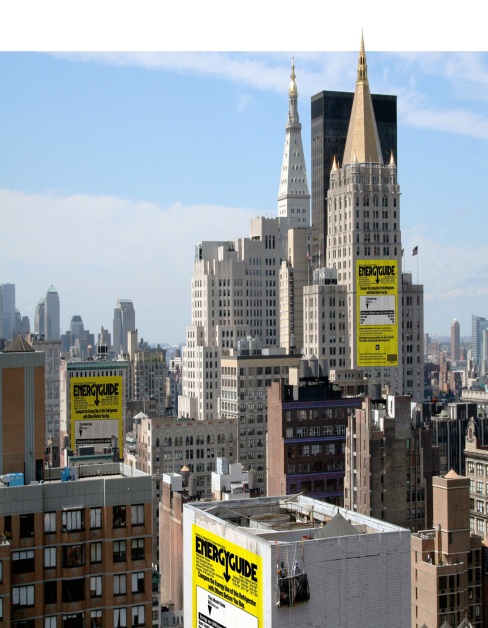By Allison Webster | Tue, August 27, 13
Everyone knows that one way to judge the performance of a car is by its fuel efficiency, and car manufacturers love to crow about cars with high 'miles per gallon' ratings. But, what if there was a way to assess “MPG” for buildings that gave potential owners or renters a sense of how much it would cost to operate their building over time? The idea is gaining traction in cities and states around the U.S., and internationally – where a number of countries require a building’s energy rating to be prominently displayed.
 Building energy benchmarking and disclosure policies allow access to information that enables the market to value and respond to building energy performance.
Building energy benchmarking and disclosure policies allow access to information that enables the market to value and respond to building energy performance — helping consumers make informed choices, similar to MPG stickers or food labels.
This year, Boston became the first city in New England, and the eighth nationwide, to enact a building energy reporting and disclosure ordinance (BERDO). In May, the Boston City Council voted to adopt energy benchmarking for large buildings. The goal? To promote energy and carbon savings in Boston’s commercial and industrial building sector, which is responsible for almost half of the city’s greenhouse gas (GHG) emissions.
Boston’s BERDO requirement provides information to owners, residents, and prospective buyers and tenants. From preliminary education, up through the real estate transaction, BERDO creates incentives to participate in energy efficiency programs. Energy efficiency in existing buildings is the single most important component of the city's plan to reduce GHG emissions by 25 percent by 2020. By passing this ordinance, Boston joins the ranks of New York City, Philadelphia, Washington, D.C., Seattle, San Francisco, Minneapolis and other major U.S. cities that have enacted energy reporting and disclosure requirements in their jurisdictions.
Numerous studies examine the benefits of benchmarking and disclosure policies and describe how BERDO is good for the economy, creates jobs, and leads to more energy efficiency improvements in buildings. Research also shows that labeling buildings with energy efficient or environmental design certifications, such as ENERGY STAR or LEED, results in higher occupancy rates, rental rates, and sale values in the marketplace than comparable, uncertified buildings.
BERDO policies are gaining traction throughout the United States as an effective means to improve building performance, save energy and money and reduce GHG emissions. There’s already talk of other Northeast communities, such as Cambridge, Massachusetts, Providence, Rhode Island, and Burlington, Vermont, adopting similar ordinances to Boston’s.
Is BERDO coming to a city or town near you? Talk to your elected officials to find out, or contact NEEP for resources and assistance on communicating the benefits of building energy reporting and disclosure policies.
Building energy benchmarking and disclosure policies allow access to information that enables the market to value and respond to building energy performance.
Building energy benchmarking and disclosure policies allow access to information that enables the market to value and respond to building energy performance — helping consumers make informed choices, similar to MPG stickers or food labels.
This year, Boston became the first city in New England, and the eighth nationwide, to enact a building energy reporting and disclosure ordinance (BERDO). In May, the Boston City Council voted to adopt energy benchmarking for large buildings. The goal? To promote energy and carbon savings in Boston’s commercial and industrial building sector, which is responsible for almost half of the city’s greenhouse gas (GHG) emissions.
Boston’s BERDO requirement provides information to owners, residents, and prospective buyers and tenants. From preliminary education, up through the real estate transaction, BERDO creates incentives to participate in energy efficiency programs. Energy efficiency in existing buildings is the single most important component of the city's plan to reduce GHG emissions by 25 percent by 2020. By passing this ordinance, Boston joins the ranks of New York City, Philadelphia, Washington, D.C., Seattle, San Francisco, Minneapolis and other major U.S. cities that have enacted energy reporting and disclosure requirements in their jurisdictions.
Numerous studies examine the benefits of benchmarking and disclosure policies and describe how BERDO is good for the economy, creates jobs, and leads to more energy efficiency improvements in buildings. Research also shows that labeling buildings with energy efficient or environmental design certifications, such as ENERGY STAR or LEED, results in higher occupancy rates, rental rates, and sale values in the marketplace than comparable, uncertified buildings.
BERDO policies are gaining traction throughout the United States as an effective means to improve building performance, save energy and money and reduce GHG emissions. There’s already talk of other Northeast communities, such as Cambridge, Massachusetts, Providence, Rhode Island, and Burlington, Vermont, adopting similar ordinances to Boston’s.
Is BERDO coming to a city or town near you? Talk to your elected officials to find out, or contact NEEP for resources and assistance on communicating the benefits of building energy reporting and disclosure policies.
 Building energy benchmarking and disclosure policies allow access to information that enables the market to value and respond to building energy performance.
Building energy benchmarking and disclosure policies allow access to information that enables the market to value and respond to building energy performance.